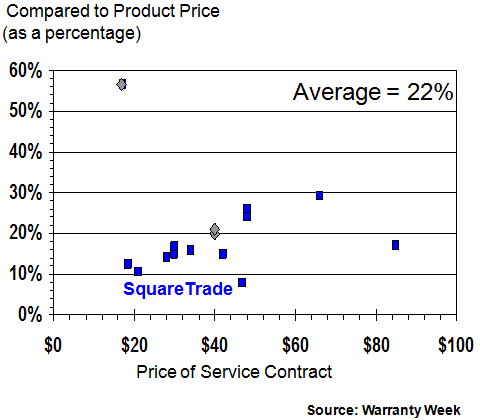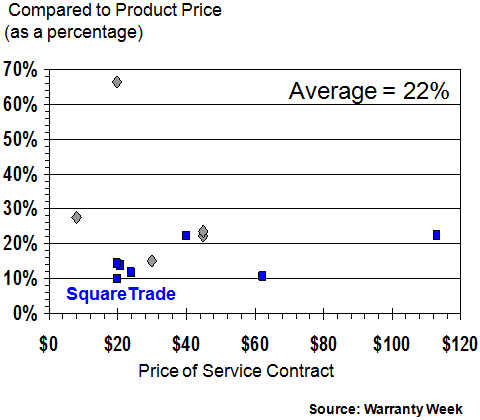Service Contract Pricing: Wi-Fi Doorbells:One of this holiday season's hottest products is likely to be those video doorbells that let homeowners see who's knocking even when they're away. But they're so new to the market, the technology is so unproven, and the risks are so unknown, that a large part of the service contract industry seems reluctant to offer protection plans for them.
As the holiday gift-giving season is about to begin in a few days, this week we turn our mystery shopping excursion towards a new type of gadget that's likely to fill quite a few stockings this year: the Internet-enabled and Wi-Fi-compatible video doorbell that allows a smartphone user to remotely see and to speak with a person at their front door.
We don't know what to call them, but they seem to be what everyone will think they need this holiday season -- this year's hoverboard. So in that spirit, we did a little advance work, finding the three most popular Wi-Fi doorbells on the market, their warranty coverage, where to buy them, and how much their protection plans cost.
The survey began with a shopping expedition for Wi-Fi doorbells at 15 major retail chains:
Amazon.com Inc., Best Buy Co. Inc., B&H Photo & Electronics Corp., BrandsMart USA, eBay Inc., hhgregg.com (Gregg Appliances Inc.), Home Depot Inc., Kmart (part of Sears Holdings Corp.), Lowe's Companies Inc.,
Office Depot Inc., Buy.com Inc. dba Rakuten.com, Sam's Club,
Sears Holdings Corp., Target Corp., and Wal-Mart Stores Inc.
Why so few retailers? We actually found the doorbells for sale at 28 retailers, but service contracts were nowhere to be found at 13 of them. These reluctant and risk-averse retailers included Abt Electronics, Adorama Camera, Bed Bath & Beyond, BJ's Wholesale Club, Costco Wholesale, Crutchfield, Groupon, Menard's, Micro Center, newegg.com, PC Richard & Son, QVC, and Systemax Inc., doing business as Tiger Direct. A few of them don't offer service contracts on anything they sell. But several have been part of our round-ups in past weeks. So why so shy about selling protection for expensive doorbells?
The answer, of course, is that these Wi-Fi doorbells are just too new and too risky to protect. Not only can they malfunction, but they're also likely to be damaged -- if not by rain and snow, then possibly by a determined thief. Add to that the possibility that jealous friends or neighbors will rip the system off the door frame, and you have too much uncertainty for some insurance underwriters to handle.
Doorbell Product Warranties
Before we looked for protection plans for the doorbells, we looked to see if there were any meaningful differences in their product warranties. From past weeks, we know that some retailers sell service contracts whose term does not begin until the manufacturer's warranty ends, so this could be a significant factor if one vendor provides extra-long or extra-short warranties. However, we found for the most part that one-year warranties covering both parts and labor are standard for all the major brands.
Three Wi-Fi doorbells seem to have wide distribution: the Ring Video Doorbell, the SkyBell HD Wi-Fi Video Doorbell, and the August Doorbell Cam. These were the three products we looked for first.
The Ring Video Doorbell is manufactured by Bot Home Automation Inc., which issues a one-year warranty for the product. It also protects the buyer if the product is stolen, providing one free replacement to anyone who can produce both a sales receipt and a police report. List price is about $200, and most retailers stay very close to that mark.
The Ring Video Doorbell Pro, selling for about $50 more, includes a slightly better camera and is a bit slimmer in the width as well (which makes for a better fit on the typical door frame). But it needs to work with an existing wired doorbell. Both units will stream live audio and video to the homeowner when someone comes to the door. For an additional $3 per month or $30 per year, a Cloud Video Recording plan will also store copies of all the visits for later playback by the homeowner.
The company also sells standalone Wi-Fi cameras, called Ring Stick Up Cams, which can be fitted with solar panels to make them truly energy self-sufficient. It also sells $30 doorbell chime modules, called Ring Chime, which plug into an electrical outlet like a room air freshener, and which will emit a chime sound when a visitor presses the doorbell. Retailers such as Best Buy, eBay, and Amazon.com sell these items bundled with the Video Doorbell in a $500 Home Security Kit.
The August Doorbell Cam, made by August Home Inc., also has a one-year warranty. But, like its name implies, it's only a camera -- it has to be connected to an existing wired doorbell. However, it also works with the company's August Smart Lock, which the homeowner can use to unlock the door remotely for a visitor.
At some retail sites, the August Smart Lock and Doorbell Cam are part of a bundle that also includes components such as a keypad. As with the Ring kits, the bundles command a higher price than the doorbells alone and are attached to more expensive service contracts as well.
SkyBell Technologies Inc. sells the SkyBell HD Wi-Fi Video Doorbell, which is also backed by a one-year warranty. It also comes with a theft guarantee. And it connects with other systems. For instance, SkyBell HD is the video doorbell component within the Honeywell Total Connect home security platform. It's also compatible with Nest Protect home security products made by Google's Nest Labs subsidiary.
Both SkyBell HD and the Ring Video Doorbell also work with Kwikset Kevo, the Bluetooth-enabled door lock made by the Kwikset division of Spectrum Brands Holdings Inc. Both are also compatible with IFTTT Inc. applets and services. Ring is also compatible with Lockitron Internet-enabled deadbolts, and has limited connectivity with ADT Pulse home security systems. SkyBell is also compatible with the Amazon Echo smart device remote control system.
Other Manufacturers
And then there were two products that we found here and there: the IQ America Wireless Color Video Doorbell, and the Zmodo Greet Wireless Smart Video Doorbell. We looked for either of these two only if the retailer didn't sell all three of the above doorbell brands.
Zmodo Technology Corporation Ltd. backs its Greet Wi-Fi doorbell system with a three-year warranty and a 30-day refund policy. But there's no compensation for theft.
IQ America Inc. makes the Wireless Color Video Doorbell, which is covered by a two-year warranty. But while the link between the camera and the monitor is wireless, it's not Internet-enabled, so it can't be used remotely by a homeowner who's away from home. So it might not even belong on our list.
What was most amazing was the reluctance of many retailers to sell protection plans for these products. Out of the 124 products found for sale, only 76 were paired with a service contract offering. That means almost 40% of these somewhat expensive and vulnerable products could not be bought with a protection plan, even from retailers willing to sell service contracts for laptops or televisions.
In Figure 1 below, the total number of products found is in blue, while the total number of product-protection pairs found is in gray. We combined the Zmodo and IQ America product lines into a single "other" category.
Figure 1
Brand of Wi-Fi Doorbells Surveyed
Two things are clear. First, the Ring product line seems to have superior distribution over August, SkyBell, and Zmodo. Part of the reason for this is because there are two models of Ring doorbells -- the standard and the Pro -- plus there's the chime, the additional cameras, and the solar panels. But even just looking at the doorbells alone, ignoring the chimes and other accessories, we found 37 products for sale and 21 product-protection pairs on offer for Ring. So that's still more than the others.
Also, not every retailer offered all three systems, and of those that offered only two brands, it was almost always August and Ring, or SkyBell and Ring. However, we should note that Crutchfield offered August only; B&H Photo offered August and SkyBell only; Sam's Club offered August and Zmodo only; and Tiger Direct offered Zmodo only. Then again, Bed Bath & Beyond, BJ's, BrandsMart USA, Costco, Groupon, hhgregg, Kohl's, Menard's, and Office Depot offered Ring only.
Second, the percentage of products that was paired with a protection plan varied from one brand to another. Only half the August Doorbell Cams were paired with a protection plan, while for Ring and SkyBell it was a bit over 60%. So not only was Ring the most commonly-stocked brand, but it was also one of the brands most likely to be attached to a service contract.
Service Contract Administrators
Over the course of going through the Wi-Fi doorbell offerings of the 15 retailers, we came across six different obligor/administrator/underwriter teams.
SquareTrade protection plans were featured at Amazon.com, B&H Photo, eBay, Office Depot, Rakuten.com, Sam's Club, and Target. Its underwriter at most of them was Starr Indemnity & Liability Co. At eBay, however, SquareTrade's underwriter was CNA Warranty Services Inc., a unit of CNA Financial Corp.
Elsewhere, Service Net and AIG was at Best Buy.
Warrantech, AMT Warranty and AmTrust Financial Services Inc. were at BrandsMart USA and hhgregg.
Lowe's protection plans were self-administered, but they were coupled with subsidiaries of Assurant Solutions as both their obligor and underwriter.
Asurion and CNA Financial Corp. were at Walmart and Amazon.com. Asurion and Virginia Surety Co. Inc. (part of The Warranty Group) were at Home Depot.
Kmart and Sears had their own in-house service contract operations.
As in past weeks, we found that Amazon.com had a competitive mix of service contracts available from multiple administrator/underwriter teams, sometimes bidding against each other for the same printer attachment. This week, we found Asurion/The Warranty Group and SquareTrade/Starr Indemnity selling Wi-Fi doorbell service contracts on Amazon.com. We have not yet found another retailer that sells multiple different brands of service contracts in side-by-side competition.
As was mentioned, we found a total of 76 product-protection pairs at 15 different retailers. Most were two-year plans, which essentially doubled the duration of the product warranty. Some also enhanced the product warranty with additional coverages such as damage from power surges. But some did not take effect until the product warranty expired.
Accidental damage from handling, or ADH, did not seem to be much of a factor in this product category. Of the 76 product-protection pairs, we found ADH coverage to be overtly included in only 10 cases, and all from one retailer: Rakuten.com. And we suspect that could have been a typo, because the plan offered was meant for cameras and camcorders, not doorbells.
In Figure 2, we're charting the length of coverage for the 76 protection plans. Well over half were two-year plans, and less than a quarter were three-year plans. Only Lowe's and eBay offered any one-year plans, and we found only four such plans between the two of them. And there were no five-year plans observed anywhere, although they might still exist undiscovered in the wild.
Figure 2
Length of Service Contracts Offered
Going back to the section above where we discussed the product warranties for a second, we noted that two of the manufacturers offer some kind of reimbursement for product theft. And we just noted that only one retailer's service contracts offered protection from damage, and possibly did so by mistake.
We mention this because we're essentially talking about a home security product that is designed to deter theft. Some of the systems are also equipped with motion detectors that will turn on the video recorder as soon as a person approaches the door. This is meant to deter the theft of packages left on the doorstep by a delivery service.
But let's take this from the point of view of a thief. The three product families are readily identifiable from their shape and size. A successful thief would either damage or steal such a system upon arriving at the doorstep. The kindest damage might be a piece of tape over the camera lens. But damage or removal would be the most likely response of a thief -- not flight, as is suggested in the companies' publicity.
So what we're saying is that the service contracts offered, if most of them cover only defects and malfunctions, don't really cover the most likely perils. Theft is covered by the manufacturer but damage coverage is largely unavailable. Theft and damage (i.e. removal and stomping on the pavement), well, let's leave that up to the lawyers to decide whether that's a valid claim.
Service Contract Prices
In the three charts that follow, we've taken the price of the service contract, and compared it to the price of the product. Because so many of the products were priced at $200, there's an inevitable clustering of the data points on top of each other, because so many of the service contract prices were the same.
In addition, because of patterns seen in past newsletters, we've highlighted the SquareTrade data as blue squares and the Sears and Kmart data as red triangles. In Figure 3, it's clear that Sears is still pricing all its service contracts at exactly 20% of the price of the products they protect. That red triangle to the left is for a $30 Ring Chime, whose protection plan was priced at, yes, exactly $6.00.
Figure 3
One- and Two-Year Service Contracts
Price of Service Contracts Offered
(as a percentage of doorbell price)
However, also notice that SquareTrade has neither the highest nor the lowest service contract offer, at least in terms of the percentages. Walmart and Asurion have the 7% offer, while BrandsMart USA and AmTrust have the 50% offer. At the extreme right of the chart, SquareTrade has six of the seven most expensive service contracts, through retail clients such as eBay, Office Depot, and Rakuten.com.
Overall, no matter what the duration of the coverage, the average Wi-Fi doorbell service contract is priced very close to the Sears level of 20%. But of the 76 product-price pairs, almost 60% are below that average, while only 40% are above it. That suggests, as a glance at these charts confirms, that there are an unusually large number of absurdly expensive service contracts in the mix.
This in turn suggests that the actuaries that price these things are nervous. Indeed, we'd go a step further and say that the newness of the technology and the perils it faces have scared many providers away from offering service contract programs for these products, and have worried those that do offer them to the point that they think nothing of demanding 50% or 60% of the product price for the protection plan.
Three-Year Service Contracts
In Figures 4 and 5, most of the data is from SquareTrade clients, so the charts are filled with blue squares. The average price of protection is a bit higher as well, at 22%. And, again because so many Wi-Fi doorbells are priced within pennies of $199.99, there is a clustering of the data points, with one on top of the other in numerous cases.
For instance, both BrandsMart USA and Rakuten.com have service contract offers on the $30 Ring Chime that equate to almost 57% of the product's price, so they're on top of each other at the very top of Figure 4. And Rakuten.com offers $48 service contracts for the August Doorbell Cam, the Ring Video Doorbell, and the Zmodo Greet, which are priced between $186 and $200. Many other service contract providers that price their plans in bands ($175 to $199, $200 to $250, etc.) based on the price of the product they're protecting are also stacking their data points.
Figure 4
Three-Year Service Contracts
Price of Service Contracts Offered
(as a percentage of doorbell price)
However, we do see some familiar trends returning. First, it's obvious that SquareTrade is almost the only plan provider bold enough to sell three- or four-year protection plans for a new product category with unknown reliability or durability patterns. We found only six retailers offering three- or four-year service contracts on Wi-Fi doorbells. Five of them are SquareTrade clients. One of those clients (Amazon.com) is shared with Asurion, which offered a four-year plan on a Ring Video Doorbell. And the sixth is BrandsMart USA, an AmTrust client, which also offered a four-year service contract on the same product.
Expensive and Risky Technology?
Before anyone reads into that some theory that Ring is the more reliable product, we should note that August, SkyBell, and even Zmodo were also well-represented in the three- and four-year plan lists. But we also note that four out of the six Ring Home Security Kits, each priced at $500 or above, came with long-term service contract offers. And PC Richard was the only retailer to even dare to offer such an expensive bundle with no service contract at all.
By the way, we're counting the Sam's Club service contracts as four-year plans, even though they're sold as three-year plans, because all Plus Members automatically get the extra year for free. Plus members also get 2% cash back and a host of other benefits above and beyond a plain Sam's Savings membership. We're going to assume that the kinds of customers interested in purchasing additional protection are also enticed by these additional benefits.
In Figure 5, there are only 12 data points, but they range from 10% to 67% of the product price. Coincidentally, both are priced at $20, with one being 10% of a $200 August Doorbell Cam and the other being two-thirds the price of a $30 Ring Chime. The lesson is, it pays to shop around, not only for the product but also for the protection plan.
Figure 5
Four-Year Service Contracts
Price of Service Contracts Offered
(as a percentage of doorbell price)
Overall, compared to the other products we've surveyed in our ongoing mystery shopping expedition, we found the sale of Wi-Fi doorbells to be tentative and uncertain in many respects. First, some of the retailers didn't even have the product names correct. Second, almost as many sellers didn't offer protection plans as did. Third, those that offered protection plans seemed to do so haphazardly, with prices ranging from inexpensive to inexcusable.
Uncertain Product Identity?
Also, this whole product category seems to be uncertain. Is it an Internet product that belongs with the laptop or smartphones? Is it a home security product that belongs in the aisle with the deadbolts and floodlights? Or is it an electrical product that belongs with the intercoms and thermostats? One retailer even had them pegged as digital cameras, which of course they are, and are not.
Just the mix of retailers involved in this mystery shopping expedition is illuminating. You have the electronics retailers, the warehouse clubs, the office supply chains, the home improvement outlets, the online electronic commerce kings, and even some of the discount camera stores selling these doorbells. Some of them don't even sell service contracts, yet they're selling reasonably expensive Internet-enabled electronic systems that scream out for protection plan options.
Like we said at the outset, lots of Wi-Fi doorbells are going to find their way into holiday stockings this season. And while it pays to do your research before you buy the product, it also pays to do it before you buy the protection plan. And just as many plan providers are reluctant to take part in this segment of the protection market because of the risks and uncertainties, so too should consumers be wary of going without any protection at all.
Happy Thanksgiving Day!
Next week, the U.S. celebrates its Thanksgiving Day holiday, followed by what's come to be known as Black Friday, the craziest shopping day of the entire year. In anticipation of that holiday schedule, we're going to skip a week on November 24 and publish our next newsletter on December 1. Yes, that's right, December is coming soon. It's hard to believe the year is almost over, but that also means the holiday shopping season is only just beginning. Please stay safe if you're traveling, and stay warm if you're not, and we'll see you again next month.
| 












